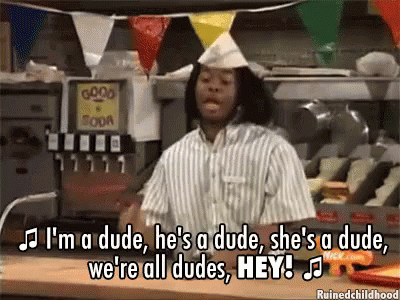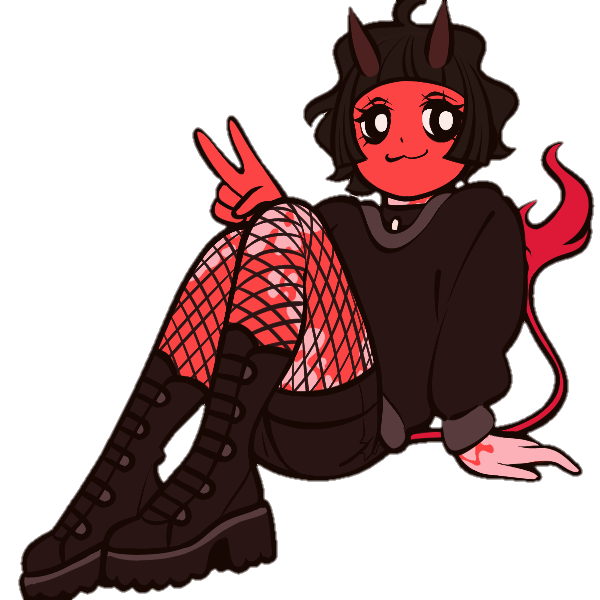Gender neutral pronouns are just so much more convenient; I tend to use them even when I know someone’s gender. I do wish English had some common-use ones that were explicitly singular, though.
I do wish English had some common-use ones that were explicitly singular, though.
In the long run I predict that “they” will follow the same path as “you” - it’ll become increasingly more associated with the singular, until it’s the default interpretation. I also predict that both “they” and “you” will eventually require a pluraliser to convey the plural.
“Vos” (you, singular) in Rioplatense Spanish followed a similar path.
If that’s correct, eventually there’ll be explicitly singular second and third person pronouns.
my prediction is for th’all and y’all or just thal and yal in the long run
I have a soft spot for ‘yous’, personally.
youse guyseses
My first bet is roughly in this direction, too.
Not outside of the US…
Most people’s English is more closely linked to American English anyway, or otherwise follow their own development path
And especially in the age of the internet, where language changes quickly spread globally
I tend to use “mates,” as “y’all” just doesn’t really agree with me.
how does that work?
“could y’all please help me” -> “could mates please help me”?Could I get some help, mates?
you dont need the word mates in that sentence ?w?
and it wouldnt work in like so many situations.
not saying you cant use it, but it doesnt seem like an adequat plural you
Well, I guess the need for “y’all” may just may depend on the user’s desired level of informality when talking/writing. (To me personally, I just don’t like using it as it just sounds wrong to me.)
Do we currently have an explicit pluralizer for they?
I think that “all” is evolving in this direction. It was already used as an explicit pluraliser for “you” (alongside “guys”, -s, and others); and now I’m seeing “they all” more and more across the internet, even in situations where the “all” clearly does not convey “every single one of them”.
Just keep in mind that this is anecdotal from my part, not backed up by hard data.
We can thank Harry for this one
(TV;DW: them’ll)
Theys
Dude is supposed to be gender neutral and singular.

Still, maybe don’t. Not everyone agrees with the gender neutrality of “dude”. How many dudes have you slept with?
Four. Will be five if my Grindr match pans out tonight.
Whoah! That’s a personal question I don’t feel like would reflect accurately my life if someone knew. There’s more to me than my body count. I contain depths and multitudes outside of the number of people I have slept with!
280ish. But there’s more to me than that!
i think there is alot to be said about the influence of patriarchy on masculine words becomming applied to everyone. men being seen as the norm and all that…
You’re correct. But also it’s a nice word. Easy to say and very casual.
Ahah, you changed it plural which genders it. It’s dudes and dudettes in that case.
Did you see that dude I slept with last night?
Totally different now that it’s a singular.
Yeah language sucks.
nah i still see “i slept with a dude” as “i slept with a man”, sorry
maybe it’s the article that makes it seem masc? A dude, vs “hey, dude!”
I think it’s the difference of referencing another person using the word “dude” vs talking to a person and calling them “dude”
Hey dude, don’t make it bad.
Take a sad song and make it better.
Well contextually you would know who the person was talking about…
If you saw a woman and confused it with a man because of word, that’s on you mate. There’s another gender neutral and singular term.
In my area “dude” is really gender neutral in most cases.
Regional dialects and all that.
Funnily enough so is “man” in a lot of cases.
For example: “Man I don’t know what’s going on anymore.” In this case “man” is less a reference to anyone in any specific way and more like an exasperation (like fuck, shit, hell, etc) and is a really common usage.
Edit: As an example of it’s gender-neutralness, “Fuck man, chill it’s just the wrong order.” In this case “man” is often used in a gender neutral way when referring to a specific person. Also man in this case can be swapped with “bro” and “dude”.
Regional dialects can get really weird in some cases, we use the same words but the meanings can be so different.
Language is a beautiful tangled knot that depending on which side you’re looking at it from it can change so much.
“man” used to mean person, it was gender neutral. In fact the root “men” just meant “to think”, so a man could be any sapient being.
It was only changed several hundred years ago. “mankind” and other similar universals were meant to represent every human and became exclusionary only under patriarchal interpretation. “mankind” of course endures as universal, but we see lots of “firewoman”, “mailwoman”, etc., where the language becomes fundamentally gendered.
Oh man, I’ve slept with like 10 dudes, 4 guys and 6 gals.
Totally agree. I think half the problem is that English is a stupid language at times. I have no problem with gender neutral terms but the plural nature of “they” makes my 54 yo brain hurt. I have the same issue with the word data. “The data are” sounds awkward to me.
You use singular they every single day or at most every single week and you have for your entire life and so did all of your English speaking ancestors including middle English.
'how far out is the pizza guy’s ‘they’re 15 minutes out’
‘my coworker was a pain in the ass today’ ‘what they’d do this time?’
‘i think my doctor is famous’ ‘oh what’s their name?’
They was singular before it was plural, and it’s singular use is still one of the most common pronouns in English.
Every example you provided was extremely unambiguous and without anything that might require distinction between singular and plural. Often language isn’t that simple. For example, “Fion had finally joined the party and they were happy about it.” Who does “they” refer to in that context? Yes, you can write/speak your way around it, but that adds extra difficulty that isn’t suited for casual speaking/writing. That is why people (who aren’t transphobes) don’t like it as a pronoun and would rather have a new word.
In your sentence they unambiguously refers to fion. It’s really not that hard for a fluent speaker. I’m not a native and this shit is simple, it’s unwritten but innately known like the order of adjectives when multiple are present.
When I was writting that, I assumed it was about the party, so clearly not so unambiguous. It could conceiveably refer to either - doubly so in casual speech where rules are bent. Fill up a books worth of text about a character using they/them pronouns (esspecially written by a bad writer) and you get confused often.
To be clear, in ideal English, its easy to use. Most English is not ideal, with words being changed, dropped, reordered, ect. based on the speaker or writer’s whim in the moment. All that is before factoring in regional varients of English.
Shitjustworks not knowing what they’re talking about and being transphobic, classic
Yes. Criticsm of the English language for not better supporting non-binary people. So transphobic. By advocating for the creation of a new non-gendered word, I’m not advocating for a more inclusive language, I’m actually part of a conspiracy with anyone who ever supported or used pronouns like “Xer”, “Zer”, and “Hir” to destroy trans rights.
Also, you’re accusing me of not knowing English, when its literally my first and only language. If that is your rebuttal, clearly you don’t have much to back up your beliefs.
Edit: and when I went to your profile to check for qualifications, literally the top one is admitting to being a hexbear user. You’re really singling out shitjustworks as problematic?
i think its mostly an issue with not being used to it. “you” is both singular and plural as well and we manage fine. “we” is plural but it does not distinguish between inclusive and exclusive “we”. arguably those cases are more rarely relevant, and honestly id prefer if all of them had solutions, but i think we can handle it once we are used to it, or solutions will develop.
btw not trying to be antagonistic here, just sharing my thoughts :3
No I totally agree. This really wasn’t a thing for my generation so it just feels weird. And I’m talking about the language aspect only. I’m totally cool with people being who they are.
I just wish there were better alternatives to convey the same meaning without these overloaded English terms. English is just an amalgamation of weird grammar and vocabulary from at least three major languages plus I’m old and change is hard.
“the data are” also sounded odd to me when I first heard it. After practice it became fine. Now I see it as a green flag that someone may be scientifically literate.
I believe I read somewhere that the singular for “they” used to be “thy”, but that makes language sound terribly old. Doubt it’ll get picked up in the mainstream
‘Thy’ is the disused informal ‘your’. There’s ‘thou’/‘thee’ but that’s still second-person.
Interesting! Do you have any etymological sources that go into this more? I’d be curious to learn
This looks like an alright starting place:
I think “thy” is singular for “your”, “thou” would be singular “you”.
Familiar rather than singular. You wouldn’t use thee and thou on someone of higher station, you’d use singular you and and singular your (QE2 used singular “we” in the same mold)
I think you have it backwards. A lot of languages (including mine) use some form of plural to address people at a higher station, which isn’t really a thing in Egnlish any more since it uses “you” for both singular and plural, but “thy” and “thou” is 100% singular - you would never use these words when addressing a group of people, no matter how familiar or above them in station you are.
Yeah that is correct, I was only describing singular usage. It is commonly believed by English speakers that thee, thou, thine were formal or that you and your are newer
Really we dumped the informal words and started addressing everyone as if they were due respect of rank or station
Yeah, I hate “xer” and “xe”
I would totally use xe/xer if doing so wouldn’t be hugely distracting from whatever topic I’m actually talking about, those words have a nice scifi vibe to them.
If that is what we come to as a society I’m game. If I said that in public today most wouldn’t know what I’m talking about
xer/xes
The pronoun for when you’re a total game freak
I tend to defer from using those when I can just use the person’s name or the ungendered pronouns. To me, when I see those besides someone’s name, it just means that they don’t want to be labeled as any gender.
Though, on that note. I honestly never really understood the purpose of people using zhey/zhem/zheir when they/them/their is already neutral.
I also make a point of saying y’all to include the 50% of humans without cocks.
What about the 99.99% of people who aren’t hillbillies?
Tom Scott has a page of reflections and corrections for that video from a few years ago. He’s a good ally but I think we all envy past Tom’s optimism.
I also appreciate the thoughtfulness he showed when he found out someone he had recently collaborated with had made transphobic comments in the past.
You’re never going to appease everyone, and I appreciate that he shared the thinking that led him to his decision. I just regret not finding out about the incident until like a week after I ordered her book.
Wow. I’m in sales and customer service and I must say that’s a fantastic note. They clearly care about their viewers, their customers, and spend the time working to earn their business. Bravo!
I’m a couple years behind on his content, who was the person he collabed with?
Jill Bearup, a Youtuber and stage/film combat enthusiast. She echoed some shitty transphobe rhetoric in a blog post years ago and deleted them. Tom asked her about it after others made him aware and he gave a very reserved description of her reply that tells me she still holds views that he doesn’t agree with or want to be associated with.
ETA: After donating what he estimated would be the proceeds of that collaboration video to the Trevor Project, he ultimately decided to take the video down altogether.
Every time I read “he or she” I think “YOU COULD HAVE SAVED FIVE CHARACTERS!!”
mad respect for counting those spaces
Every byte is sacred
code.golf approves
Happy binaric chittering.
Programmer brain go brrrrr
{s,}he
He/she
s/he
length(“s/he”) == length(“they”)
It also just sounds awkward to say he/she
es he
(s/t)he(y)
“He or she” is so clunky and I immediately think they must be 50+ when I see someone writing it.
Fun side fact “the player” is a masculine noun in German, so many boardgames seem sexist because they are mistranslated as “the player… he…”
But when the World needed him most, he vanished.
Roses are red, violets are blue, singular they predates singular you.
No rule in title = you must eat 196 gummy sharks, WITHOUT A YOUTUBE VIDEO
also my homophobic mom threw away a book because the talking plant wanted to be called ‘they’ instead of ‘it’ and it’s too woke for her. LITERALLY JUST A TALKING PLANT 😭
Your mom should definitely check out the monk and robot series by Becky Chambers. The first main character (the monk) uses they pronouns but the robot uses it pronouns. Your mom will love it!
kill
Telling someone to kill their own mother seems a bit sociopathic
what?
People who were/are upset about singular they really don’t understand that language change is pervasive and unstoppable. Shifts in pronoun agreement are no different.
Prescriptive grammarians cling to their (arbitrary) rules because they believe in a “pure” form of the language. That itself is a misunderstanding and just mirrors other common things some people do to divide the masses. Do not listen to such people.
As someone deeply engrained in the field of Linguistics for decades (personally, academically, and professionally), I can tell you that one of the biggest challenges in teaching people how language actually works is breaking down the preconceived notions they have about such things – the exact notions those prescriptivists tout.
Again, the corrupt and unsound form of speaking in the plural number to a single person, you to one, instead of thou, contrary to the pure, plain, and single language of truth, thou to one, and you to more than one, which had always been used by God to men, and men to God, as well as one to another, from the oldest record of time till corrupt men, for corrupt ends, in later and corrupt times, to flatter, fawn, and work upon the corrupt nature in men, brought in that false and senseless way of speaking you to one, which has since corrupted the modern languages, and hath greatly debased the spirits and depraved the manners of men;—this evil custom I had been as forward in as others, and this I was now called out of, and required to cease from.
Thomas Ellwood, ca. late 1600s.
This kind of thinking is exactly what is meant by “prescriptive grammar”. It is, in many ways, not even grammar, at least not in the scientific sense.
Amusingly enough, modern day prescriptivists would now probably flag Mr. Ellwood for a run-on sentence.
People who were/are upset about singular they really don’t understand that language change is pervasive and unstoppable.
What do you mean by this, exactly? As someone who is deeply “engrained” (?) in the field of linguistics, surely you must be aware that singular “they” has been in usage since the 14th century.
It has been in usage a long time – and yet, it is still considered “improper” English by many a grammarian (though improper English is as nonexistent as Standard American English).
In the 18th century, there was a push away from singular they on the basis that it did not fit within the logic of the agreement paradigm as some understood it. Most (if not all) rules suggesting it is poor usage derive from this thinking.
But this is exactly the problem: the fact that singular they arose naturally is the point. If it does not fit within one’s understanding of the agreement paradigm, then that understanding is wrong. That is the key difference between prescriptivism and descriptivism, at least in the way those are often discussed in Linguistics.
If those grammarians cared about grammar as much as they claimed, they would be seeking to better describe it and not trying to change the way that others use it. When I say that they don’t understand “language change is pervasive and unstoppable”, I mean that prescriptivism is naturally conservative in suggesting that one should not deviate from some particular usage; that isn’t how language works.
PS- I assume your quoting is to suggest “ingrained”, but I’d argue that ingrained and engrained both work in this context. Even if we disagree there, spelling isn’t really about language either – simply one possible representation of it. Given that the purpose of language is information transfer, if I had put “ngrayned” above and you had gotten my meaning, then it would have served its purpose.
Fun fact: there has been more time between the first use of singular they and today than there was between the first use of plural they and the start of the criticism of singular they
Yup.
Singular They is only hated by the uneducated and stuffy grammar nazis from the 1920s
The Wikipedia page says it was criticized in the mid 18th century
I was gonna say… The use of singular they has been around for a heck of a lot longer than 11 years. I didn’t realize it dated all the way back to the 14th century though, that’s neat.
I get the point, that it wasn’t in common use until somewhat recently (even growing up I had textbooks that used he exclusively), but it’s not a new radical concept of the English language either.
I still don’t get why people have such an issue calling people what they want to be called.
You don’t balk at a guy or a girl named Robin, or Alex, or any of a hundred different androgynous names…
But you take issue with “he”, “she”, and “them”?
Why?
My only problem, and to be clear this is entirely my problem, nobody else’s, is that I’m so dumb, I frequently forget and call someone he/she when they prefer they/them. I fuck it up sometimes. I try, but decades of societal norms are getting in the way of me getting it right sometimes.
To every person who identifies as they/them please forgive me because I’m going to screw it up. Just correct me when I say it and hopefully in time my brain will stop making this mistake.
Because a bunch of bad faith actors have been carefully building an outrage-generating cash machine on the idea of ‘culture wars’ for decades.
Culture war, race war, nationalism wars…
As long as it’s not a class war, they’re okay with it.
I still don’t get why people have such an issue calling people what they want to be called.
Why?
Normally I’m the type to wax philosophical for a few paragraphs about what the heck may be going on in their heads, but honestly I think it’s assholes being proud to be assholes. Punching down just feels so good. That and people who are suffering enough that they don’t care about others, but don’t realize they need to work on their mental health. Or they’ve been conditioned to see doing that as a character flaw or weakness. And of course the snowball effect of those people raising the next generation of assholes, building up some inertia behind the generational trauma.
Because underlying it all, regardless of which impactful arguments they think they are making or refuting, they just don’t want to be nice to people that are different.
Fair enough. I honestly just think they can’t see the forest because of all the trees in the way.
They’ll cry foul on someone insisting on being called by they/them pronouns, arguing that it’s an incorrect usage of they/them, or whatever the argument of the week is, then immediately use they/them pronouns for an individual in a different context without batting an eye, or even realizing what they’ve done.
Ignorance and hypocrisy.
Definitely, because the issue is not with the words but with the people who are different that they don’t want to be nice to, lol.
By being offended I don’t start calling them by their pronouns right away my brain immediately goes into defense mode and refuses to acknowledge whatever the fuck they identify as.
Fairly certain most don’t get offended at genuine mistakes. It’s doubling down that usually upsets people, and if you’re the type to immediately go “well fuck you”, I suspect that may be the case with you.
Thank you. I’m elated to hear that most don’t get offended at genuine mistakes.
That’s all I really needed.
Remember that it’s the loud ones we hear most. If a hundred people just say nothing to avoid awkwardness, a dozen correct you politely and a single one kicks up a fuss, it’s the fuss you will remember.
It’s also easy to take corrections way more personally than they’re intended. Someone saying “It’s they, actually” isn’t an expression of offense, even if it can feel bad to be corrected (because it feels bad to be “wrong”). Compare it to bumping into someone you didnt see, who then goes “watch out” to point out there’s someone in the way – they’re not necessarily upset, just informing you.
And finally, sometimes people are just irritable for whatever reason. They might not usually get offended, but for whatever reason will lash out that one time. To take the analogy of bumping into someone, perhaps their shoulder was already sore.
There certainly are some that do get offended. Some are so upset with the norms people grow up with they end up lashing out at those people instead. Some genuinely lack any understanding or patience for the other side of the issue. Some are just plain entitled. Some are looking for things to be upset at. Assholes exist in just about any sufficiently large grouping of people.
But for most I’ve known, it’s really just about mutual respect, and often there’s a base assumption of respect too. We all know how hard it can be to untrain a habit, and most people don’t want unpleasantness. Don’t let the exceptions get to you.
It’s pretty obvious when someone misgenders by mistake or reasonable ignorance. If someone gets upset about that it’s probably because they feel insecure about it at that point in their journey. Just correct yourself if you catch it and move on, be open to civil feedback if you don’t.
In any case if you feel unsafe around someone because of their behavior then consider spending less time around them. You don’t have to feel like you’re stepping on eggshells if you’re making an honest effort to learn and improve.
If they’re here, then why am I alone 😓
Tom Scott also hated reddit before it was cool
tbh gendered pronouns are stupid. We should call everything it.
laughs in Finnish
Yeah, realised pronouns were stupid because of finnish.
Edit: gendered pronouns
gendered pronouns*
oh yeah. People who complain about just pronouns are the ones who are bad at english, everyone has pronouns, it came with speaking a langauge.
Mean, not like need pronouns at all. Just speak like cavemen.
Nah fam, we kinda shat the bed on that front
I love linguistics but it has some weird stuff in it.
Chinese doesn’t have gendered pronouns in the spoken language. “He”, “she”, and “it” are all pronounced, “tā”. Possession and number are done by adding 的 (de) or 们 (men) after the pronoun, irrespective of gender. Originally, there was only one character for “tā”, 他. In the early 20th century there were several westernization movements in China. One of them included adding gendered pronouns, in order to be able to more accurately translate English texts. Thus, 她 (she) and 它 (it) were adopted. (they used to mean other things and were repurposed). One immediate problem that people noticed was the choice of components. 他 includes the 亻component, which means “person”. 她 replaces it with the 女 component, which means “female”. So some linguists pointed out that this implies that women aren’t people. The current situation is that people tend to use, 她, when there is a single subject who is known to be female. When it’s unknown or there are multiple subjects they default to, 他 or 他们.
German is heavily gendered. You can still linguistically gender someone correctly but, in addition to pronouns, you also need to match adjectives. You also need to get comfortable with the gender of nouns often not making any logical sense. eg:
Moon - Der Mond - masculine
Girl - Das Mädel/Mädchen - neuter
Sun - Die Sonne - feminine
There’s the added confusion that the third person feminine singular, is spelled and pronounced the same as the second person plural. The second person doesn’t differentiate in gender but it’s often impolite to use the singular so it’s common to refer to males as “Sie”. Not to say that any of that is hard. Native German speakers constantly need to match the gender of adjectives to nouns so they’re very used to it.Russian seems to be more complicated. I recently read that Masha Gessen uses, “they”. https://en.wikipedia.org/wiki/Masha_Gessen It seems that Russian uses gendered past-tense verbs. They originally used masculine verbs out of, “hoping that I would wake up a boy. A real boy” but switched to feminine verbs as a teen and stuck with that. If anyone speaks Russian well I’d love to hear more about how gender is used and perceived in Russian. Particularly from the linguistic, rather than the cultural, perspective. It looks like Russian does have gendered pronouns https://www.russianlessons.net/grammar/pronouns.php but the Wikipedia article doesn’t say which they use.
edit: clarifications and grammar
i like this comment but i feel the need to reply because it touches upon a pet peeve of mine in linguistics: there is a persistent myth in the modern period that grammatical gender is useless, pointless, or somehow arbitrary and is just some sort of vestigial, rotting, lexical limb that made it to the 21st century by fluke.
this is simply not true. just because grammatical gender often appears arbitrary or illogical doesn’t mean it actually is. and just because grammatical gender follows many, many rules does not mean there are no rules. grammatical gender is just a fairly common form of noun class system. as with most forms of noun classing, what the rules are in a given dialect can be a little wishy-washy but they are certainly not arbitrary.
for example, you point out the german Mädchen as an example of illogical noun gendering. this is an opinion often expressed by foreigners learning the language, and even by linguistically-ignorant germans. it makes sense on the face of it, this word has a similar meaning to the english phrase “little girl,” so it is strange the germans decided to sort this word into the neuter gender, no?
well, no. it isn’t strange and it isn’t illogical, in actuality. -chen is a diminutive in german. for those who are unaware, diminutives are suffixes/prefixes in languages that serve to make nouns feel smaller or more cute in a language. think booklet vs book or dog vs doggie for some english examples.
what are some examples of more german diminutives?
das Kätzchen - kitten
das Hündchen - puppy
das Plätzchen - a cookie (depends on dialect exactly what this refers to afaik but generally is always some sort of cookie)
das Ohrläppchen - earlobe
noticing a trend? these are all neuter! and thus we uncover a little grammatical rule that grammatical gender was trying to tell us. all diminutives are neuter.
most every “arbitrary” example of grammatical gender people provide has some sort of similar reasoning or rule behind it, some story or information it is trying to give you that makes speaking the language that much easier.
just because what it is encoding doesn’t seem useful or logical to (rhetorical) you doesn’t mean it is not. grammatical gender is much more than just gender-washing everyday speech for kicks and does carry useful meaning, if you can be bothered to puzzle it out. attempts i’ve seen to “de-gender” spanish (this is just what is local to me) all fundamentally misunderstand what it is they’re even trying to do and often opt for rotely tearing out the entire gendered case system without offering proper lexical and linguistic infrastructure for the language to actually effectively function without it. these attempts sound clunky because they are clunky! and to be perfectly clear i’m not dogging on the premise, just the serious attempts i’ve seen implemented in real life speech and their implementation. i think it’s relevant bc it showcases how modern misunderstanding of what grammatical gender is can realize as actual, negative manifestations in the non-conceptual world. why this is important to think about more than passingly!
edit:formatting
The big thing that people get wrong and which makes me so very tired is that IT’S NOT SOCIETAL GENDER, it’s just a case of terrible terminology that we’re stuck with. A chair isn’t feminine or whatever, it’s just that words related to femininity happen to be in the same class as other words.
I really wish we could all agree to call it basically anything else, like “genre” which shares the same root but doesn’t create the connotation to societal gender.
Thank you for your thorough response. You make some good points. I think we’re talking about slightly different topics though.
There’s always some explanation to why certain words or grammar forms evolved. Sometimes those reasons are commonly known, sometimes the “commonly known” reasons are wrong, sometimes linguists argue about the origin, sometimes they have no idea.
For everyday speakers, the “logic” of immediate usage, is more important than the etymology.
German speakers are generally aware of the “rule” that diminutives are neuter. If you look at this list words, some of them have non-diminutive forms;
Die Katze
Der Hund
Die Ohrlappe
Two of them don’t really.“Platz” is grammatically, the non-diminutive form of “Plätzchen” but it doesn’t mean “(normal sized) cookie” (aside: Not to make fun of our Northern friends but “Keks” gets around that confusion) “Magd” is the non-diminutive form of “Mädel” but girls aren’t (generally) “little maids.” I can’t remember the last time I heard anyone say, “magd” to refer to a living person.
Also notice that when we strip off the diminutives, the remaining words are no more “logical”. Cats and earlobes aren’t inherently feminine and dogs aren’t inherently male.
My usage of “logic” in the context of German grammar, is that grammatical gender is often at odds with both self identified gender and biological gender. German speakers are generally comfortable saying “Der” about subjects, that nobody would think of as male. German speakers are likewise comfortable saying “Sie” about subjects that nobody would think of as female and, “Das” to subjects that are very obviously not neuter.
The reason for contrasting several languages was that I suspect there are different cognitive loads involved in correctly gendering people, depending on language. Many people notice that native Chinese speakers routinely “randomize” he/she/it. They don’t just misgender trans-people, they often just forget which one means which. German speakers are pretty used to playing around with endings to imply additional meaning. “Dutzen” is often done without the word “du”. Speakers easily put together the correct endings for the singular and listeners instantly recognize the implication.
As a final example, I’d offer the sentence, “___ ist ein fesch__ ___.” I posit that if I insert “Die” vs “Der” into the sentence, most German speakers would instantly correctly fill in the rest of the blanks with, “-es Madl” or “-er Bua”. If you try to say the wrong one it just sounds weird.
Tom Scott is so jacked in that video!
Ngl, took me a long while to get used to defaulting to “they” after a lifetime of assuming “he”.




























